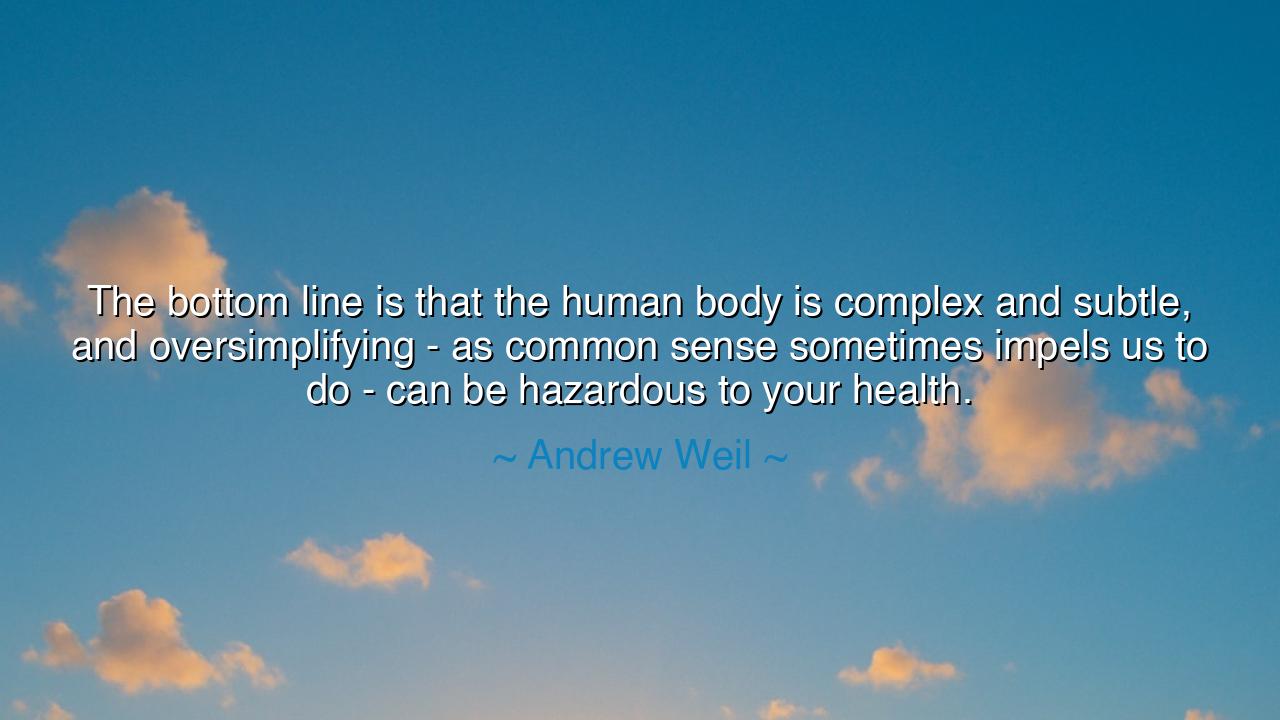
The bottom line is that the human body is complex and subtle, and
The bottom line is that the human body is complex and subtle, and oversimplifying - as common sense sometimes impels us to do - can be hazardous to your health.






“The bottom line is that the human body is complex and subtle, and oversimplifying – as common sense sometimes impels us to do – can be hazardous to your health.” – Andrew Weil
In the age of rushing minds and restless hearts, these words from Andrew Weil stand like an ancient pillar of truth, reminding us that the human body is not a mere machine of flesh and bone, but a living temple of infinite intricacy. Too often, people seek a single answer, a single cure, a single rule to govern health — forgetting that the body, like the cosmos, thrives in balance and mystery. To oversimplify its workings is to invite arrogance; to assume mastery over it without reverence is to risk ruin. For within every heartbeat and breath lies the subtle dialogue of spirit, mind, and matter — a conversation too sacred to be reduced to slogans or trends.
Long ago, in the city of Kos, there lived a man named Hippocrates, whom the ancients called the Father of Medicine. He once said, “Nature itself is the best physician.” Yet even he, in all his wisdom, refused to claim full knowledge of the body’s ways. He watched, listened, and learned — from wind, from seasons, from the pulse beneath the skin. He knew that health was harmony, and that no herb or ritual alone could restore it without understanding the whole person. When his students asked for the secret of healing, he told them not to divide the body from the soul, nor the sickness from the life that bore it. Thus, even in antiquity, the wise knew what Weil now reminds us: that simplicity can be the mask of ignorance when it meets the complexity of human life.
And yet, through the centuries, men have forgotten this truth. They sought potions without patience, machines without mindfulness. In the 19th century, during the dawn of modern medicine, doctors often prescribed poisons like mercury or bloodletting to “balance humors” — acts of overconfidence disguised as common sense. Thousands suffered because they believed in a singular rule: that what worked for one must work for all. The hazard of oversimplification became their teacher, and too late they learned that the body’s wisdom surpasses the physician’s pride.
Consider too the story of Dr. Ignaz Semmelweis in Vienna, who in the mid-1800s noticed that mothers died of fever more often in hospitals than at home. He discovered that simple handwashing reduced deaths — yet his peers scorned him, for it contradicted their “common sense.” They thought him mad. Only later did science prove his insight true. The lesson is profound: even simplicity must bow before evidence, and even “common sense” can blind us when it ignores the subtle truths that lie beyond its comfort.
The complexity of the human body mirrors the complexity of the universe itself — an orchestration of trillions of cells, each in communion with the other, ruled not by a single law but by the harmony of many. When we eat, when we sleep, when we love or despair, each act ripples through unseen networks of hormones, nerves, and thought. To treat health as a switch to be flipped, or as a single problem to be solved, is to misunderstand the miracle of life itself. Subtlety, not simplicity, is the mother of wisdom.
So let the seeker of health become humble. Let him observe his body as one would a sacred grove — learning its seasons, its rhythms, its needs. Listen to the whisper of fatigue, the gentle protest of pain, the deep sigh of renewal. Do not chase one rule or one cure, but seek balance — in food, in movement, in rest, in thought. For the body speaks softly, and only the patient will hear its song.
The lesson is clear: reverence for complexity is the beginning of true understanding. Be wary of those who promise easy answers to deep mysteries. Instead, cultivate curiosity, humility, and mindfulness. Seek not control over the body, but companionship with it. As Andrew Weil reminds us, the body is not an enemy to be conquered but a teacher to be understood.
Therefore, let each day be an act of respect toward your own being. Eat with awareness. Move with grace. Rest without guilt. And above all, remember that the human body, in all its subtle glory, is both fragile and divine — and those who honor its complexity shall walk in the light of lasting health.






AAdministratorAdministrator
Welcome, honored guests. Please leave a comment, we will respond soon